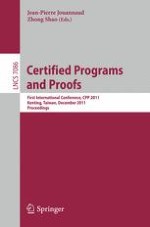2011 | Buch
Certified Programs and Proofs
First International Conference, CPP 2011, Kenting, Taiwan, December 7-9, 2011. Proceedings
herausgegeben von: Jean-Pierre Jouannaud, Zhong Shao
Verlag: Springer Berlin Heidelberg
Buchreihe : Lecture Notes in Computer Science
